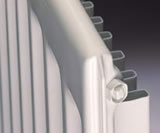 According to new research undertaken by Screwfix, it seems the problem with around half of young men in the UK is they simply do not know how to bleed a radiator.
According to new research undertaken by Screwfix, it seems the problem with around half of young men in the UK is they simply do not know how to bleed a radiator.
As reported by Northern Gas Heating, the study into how men of different ages cope with a poorly performing central heating system shows that approximately 50% of males aged in their 20s would call for professional help where the situation requires a radiator to be bled. In contrast, only 17% of older men would hire the services of a plumber or suitably qualified gas engineer in order to bleed a radiator. Why are younger men seemingly incapable of fixing this relatively straightforward problem?
It has been suggested younger generations know much less about practical DIY matters because they have been brought up in an academic environment. Whilst such an opinion is impossible to dismiss or endorse with any reliability, the fact remains many young men in the UK are either incompetent or not sufficiently confident to fix their own central heating systems. Although this is arguably a good thing (nobody could seriously suggest a clueless individual tinkering around with a gas condensing boiler is a good idea) it does become somewhat more problematic where the simple task of bleeding a radiator is concerned. In fact, it is thought the relatively minor issue of trapped air in radiators accounts for many cases of inefficient central heating systems in the country, which is obviously not good for the environment.
Bleeding a radiator is a relatively straightforward task that can be safely handled by even the most inexperienced of men (or women). In most cases, bleeding a radiator simply involves loosening the valve at the side of the radiator with a special key (sensibly called a radiator key). As soon as water begins to drip out of the radiator (usually after a hissing sound associated with escaping air is heard), the valve can be tightened again. This simple process removes the air from the radiator and ensures that it works with optimal efficiency.



It should be noted that the system should be run to get things warm then switch the system OFF before you try to bleed the radiators. If you try to bleed a radiator while the system is running, you will let more air in to the system and make matters worse….
Hope this helps a few ‘modern men’……
Also not mentioned ,is the fact that the pressure on your boiler ,if a pressurised system ,I.E.a combi boiler, may drop after bleeding
this will have to be put back up to correct pressure usually about 1.5 bar,
this is simple IF YOU KNOW HOW TO!!
i myself often bleed the radiators but i find that alot of water comes out and i have to get a towel and discoloured hot water of which makes a mess i always wonder what i am doing wrong
I HAVE BLEED MY RADIATOR THE AIR AS COME OUT ,BUT PART OF THE RADIATOR IS STILL COLD
Be very careful, I bled a radiator for my Mum and unknown to me the valve came out and so did gallons of water, caused a big problem, still sorting it out.
You must be careful when bleeding radiators as often the whole end section unscrews rather than just the bleed valve.